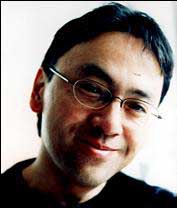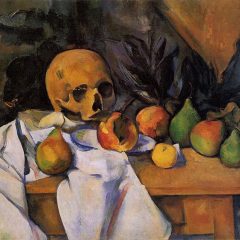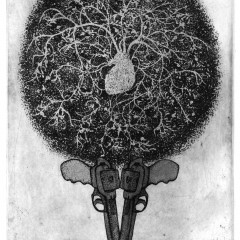 I was listening to “Fresh Air” on the radio and heard a Maureen Corrigan review of Kazuo Ishiguro‘s new novel “Never Let Me Go” and it reminded me I wanted to tell you about hearing the author at the Free Library last week.
I was listening to “Fresh Air” on the radio and heard a Maureen Corrigan review of Kazuo Ishiguro‘s new novel “Never Let Me Go” and it reminded me I wanted to tell you about hearing the author at the Free Library last week.
Not so much to tell you about his new book, which I haven’t yet read (but which sounds awfully interesting: it has to do with cloning. Corrigan called it “frustrating and unforgettable”). But I thought Ishiguro, who was being interviewed by Alvaro Ribeiro, S.J., a Jesuit teacher at St. Joseph’s University, had much to say about the career of an artist that was applicable to visual artists as well as to writers.

(Quick bio: Ishiguro, whom Ribeiro called “Ish,” was born in Nagasaki, Japan in 1954 and came to Britain at age five. His book “An Artist of the Floating World” was short-listed for the Booker Prize in 1986 and “Remains of the Day” won the 1989 Booker Prize. Ishiguro lives in London with his wife and daughter. See British Council site for more.)
In no particular order, here are things I jotted in the margins of my handout. Note: I wasn’t really “on the job” but I guess I’m always on the job. My dreams are full of note-taking.
Q. What do you know about writing now that you didn’t know when you started out?
A. My 50-year old can’t inform the 20 year old. Novel writing is not something you get better at. I know that’s not a popular stance. Novelists peak early — three or four years after athletes.Look at authors and see when their great books were written. We think they’re august but the prizes given to the old are for things written when young. Many writers peak in their ’40s. It’s a disturbing thought for me, a 50-year old author.
Re: Booker Prize. I was short-listed when I was 31 years old. I felt the most pressure on me. It was very inhibiting. People said oh it just a matter of time before he gets it. I wanted to explore and fail but the pressure …I felt tremendous relief when I got it. (three years later). “Thank goodness it’s out of the way,” I thought.
The Booker prize demystifies high literature. You have critics reading books but you also can bet on who will win. It was on television.
If I was a 31-year old author now I’d say you have to go for it now. Nowadays the young authors worry about sales. They should worry about where to put their talents.
Re: cloning. As a work of fiction, the book [“Never Let Me Go”] doesn’t have the discipline to enter into the discussion. It’s fiction. It can be manipulative and emotional.
Q.Stephens (the Butler in “Remains of the Day”) seems like an old school Samurai. Were you thinking that?
A. Stephens is all of us. We’re all servants.”
So, here’s one person’s experience of early success and its pressures. And here’s a 50-year old writer saying that he’s probably peaked. Is his point about peaking valid or is it perhaps just a fear expressed by one with great success thrust on him early in life?










